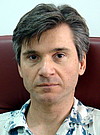Staff
Dionissios Hristopulos, Director of Master's Program in Machine Learning and Data Science

Dr. Dionissios Hristopulos (Professor, School of Electrical and Computer Engineering) is the founder of the Geostatistics Research Laboratory at TUC. He holds a Diploma in Electrical Engineering from the National Technical University of Athens (1985). In 1991 he obtained a PhD in Physics from Princeton University. At Princeton he conducted his dissertation research (which involved the development of computational Monte Carlo tools) in the Condensed Matter Physics group of Nobel laureate Philip W. Anderson. He has worked for two years as Post-doctoral Research Associate and for five years as Research Assistant Professor at the Department of Environmental Sciences and Engineering at the University of North Carolina (Chapel Hill, USA) where his research focused on theoretical studies of flow and geostatistical applications. He then analyzed various industrial data and built theoretical models of paper strength and paper processing for two years as Research Scientist at the Pulp and Paper Research Institute of Canada (current name, FPInnovations). He moved to TUC as Associate Professor in 2002 and was promoted to Full Professor in Geostatistics in 2007. His research over the last 18 years has focused on novel methods that combine geostatistics and statistical physics for the analysis of space-time data. His expertise involves both theoretical methods and computational investigations. He is the coauthor of 204 publications (journal articles, conference proceedings and abstracts, technical reports) and the book “Spatiotemporal Environmental Health Modelling” (Springer, 1998). He is the single author of the book “Random Fields for Spatial Data Modeling” (Springer). He is serving on the editorial board of the journals Stochastic Environmental Research and Risk Assessment (published by Springer) and the Computers & Geosciences (published by Elsevier).
You can also find me at the following pages: